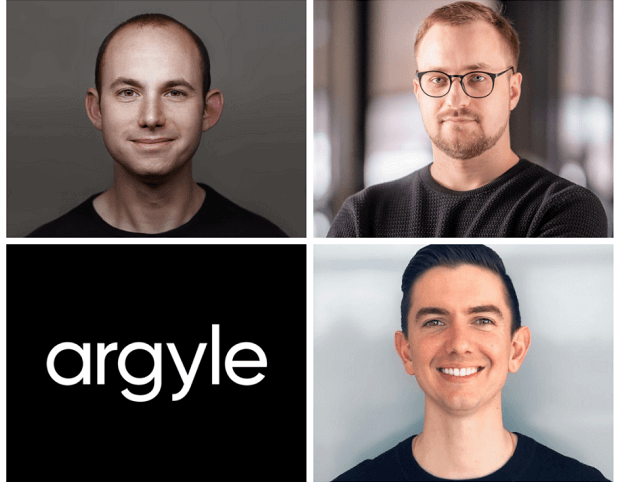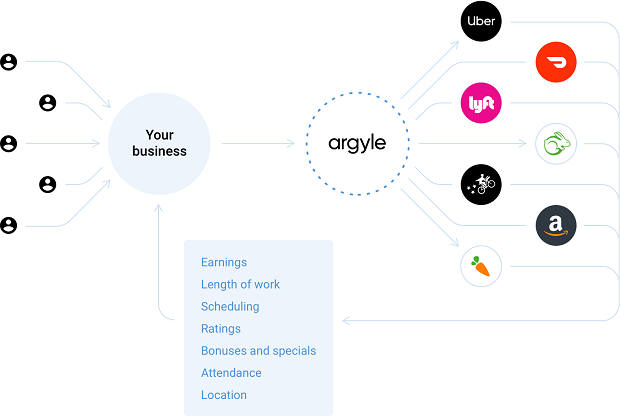We recently had the opportunity to sit down to talk to the founders of Argyle, an infrastructure-as-a-service company that makes workforce data (everything from UBER to Fiverr) accessible through a single API. Insurance providers, lenders, credit card issuers, and applicant tracking systems use Argyle to unlock the power of workforce data.
Shmulik Fishman is a Founder and Chief Executive Officer of Argyle. Before Argyle, Fishman was the Chief Operating officer of STRATIM, a company he co-founded in 2014. STRATIM raised over $40M in venture funding and sold in 2018 to KAR Auction Services, an $8B publicly traded company.
Audrius Zujus is a Founder and Chief Technology Officer of Argyle. Previously, Zujus was Founder and CEO at Aresi Labs; CTO at BPTI; Technology Consultant at Deloitte; and Strategic Advisor at NATO.
Chris Hansen is a Founder and Chief Revenue Officer of Argyle. Previously, Head of National Accounts at STRATIM (Acquired by KAR); Director at AOL (acquired by Verizon); Director at Adap.tv (acquired by AOL).

Q: What does Argyle do?
A: Argyle provides the infrastructure for businesses and end-users alike to access workforce data. Applications leveraging Argyle can allow their end-users to credential into their work accounts securely, providing source-based data for more efficient underwriting, monitoring, and a tailored user experience.
Q: What problem does Argyle solve?
A: As work continues to become increasingly fragmented, the infrastructure to access products, services, and opportunities as a dynamic or ‘non-traditional’ worker is lacking. While platforms generate a wealth of valuable data that more accurately portray an end-user’s work identity, the data is not portable let alone formatted in a clean and consistent way for use by companies in insurance, lending, banking and more.
Q: Who are your competitors? What makes Argyle unique?
A: We have three sets of competitors, the first being our customers themselves. Many businesses see the value in allowing their end-users to plug in their accounts and create one-off integrations. The issue for them becomes trying to scale these efforts across multiple data partners while the amount of data sources and workforce platforms continues to grow exponentially. Argyle’s sole mission is to play in the infrastructure space allowing customers to spend more time focusing on offering great products and services and less time (and overhead) managing data partners.
The second competitive set includes API providers in the finance space. While aggregators such as Tink, Plaid, and Yodlee have paved the way providing infrastructure tools to access financial data, we believe there is an even larger opportunity to gain more granular insights by allowing end-users to plug-in their workforce platforms — bearing not only financial insights such as income earned before payout transfer but a holistic view of a worker’s identity including typical hours, work trajectory, reputation and more.
Argyle’s last group of competitors include legacy players in the verification space such as Equifax’s The Work Number and a more recent competitor TrueWork. While these companies are more focused on traditional work, they provide methods of identity and employment verification for a similar set of customer verticals. Argyle is unique in that our data is both source-based and credentialed by our end user. The fabric of the Argyle Data Network differentiates us.
Q: Where do you see the opportunities for growth for Argyle in the next three years?
A: A great benefit of being an infrastructure company is that so long as the industries we’re supporting grow, theoretically, we should grow. There are thousands of applications, products, and services that can be unlocked to provide new opportunities to flexible workers and we’re excited to see how companies build on top of Argyle within lending, banking, insurance, benefits, and work services.
One specific area of growth we will be focusing on is expanding our Argyle Data Network beyond simply ‘gig-economy’ companies. Argyle was created not only for ride-hailing drivers and app-based workers but for everyone who will soon be partaking in some form of ‘transactional’ or ‘shift-based’ work. This includes professional services companies, HR management systems, payroll systems, and numerous other platforms who contribute to what we consider ‘workforce data’ today.
Q: How is Argyle positioned to support these opportunities?
A: We’re uniquely positioned given our deep technical expertise in how data is structured within workforce platforms and our understanding of vertical-based client needs.
I’d add that we have the benefit of being a first mover when it comes to accessing workforce data in this new way while also being able to learn from the API businesses who have come before us. This combination positions us well to scale quickly and be differentiated while not reinventing the API Infrastructure business model.
Q: What do you see as the key challenges facing Argyle over the next three years?
A: One area that we foresee being a challenge as well as an opportunity is the political climate as it pertains to flexible workers and data exchange. With regulation such as PSD2, open banking, and GDPR in Europe, we imagine the rules around data and privacy in the US continue to shift frequently making compliance an evolving and dynamic priority.
Q: How is Argyle positioned to overcome these challenges?
A: Argyle will definitely be at the table to push these conversations forward on behalf of the end-users who deserve access to their data and better infrastructure to manage it. We’re not only joining active organizations to help move the needle but spearheading our own as well (more to come on this soon!)

 Recommended:
Recommended: 